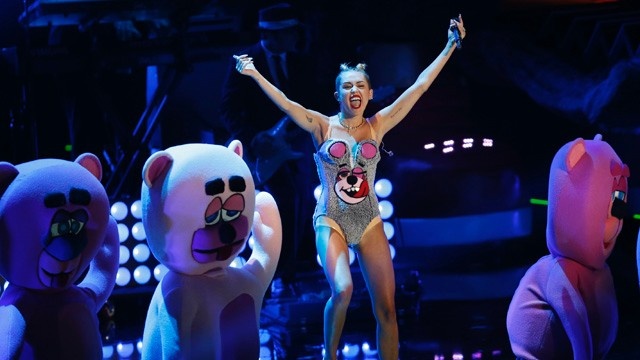Fair warning: this will be YET ANOTHER column on Miley Cyrus, so proceed accordingly. THERE’S SO MUCH TO UNPACK HERE, YOU GUYS.
[related_content slugs=”check-your-privilege-white-people,the-fetishization-of-pregnant-celebs,opening-a-vital-dialogue-from-tragedy” description=”More SCREAMING IN ALL CAPS” position=”right”]
A great deal of virtual ink has been spilled about Cyrus’ MTV Video Music Awards performance — or, as Vulture’s Jody Rosen rightly called it, “Miley’s Minstrel Show.” She donned flesh coloured underwear, twerked alongside giant teddy bears and had one-sided interactions with plenty of black ladies’ buxom bottoms for a performance that made headlines and water cooler conversations everywhere come Monday morning.
Many people — mostly of the pearl-clutching, WON’T SOMEONE THINK OF THE CHILDREN!? variety — were scandalized by the in-your-face, hyper-sexual nature of the performance, deeply disconcerted by Miley’s gyrating, tongue wagging and air humping. This is HANNAH MONTANA, after all. WHAT IS THE WORLD COMING TO?
(To the parents lamenting the death of Hannah Montana: it’s important to remember that Hannah Montana isn’t Miley Cyrus and Miley Cyrus isn’t Hannah Montana and neither should be raising your kids.)
But to say the shock value of Cyrus’ performance was purely sexual is to miss the point. The controversy, from where I’m sitting, has less to do with sex and more to do with race. And I’m not just talking about appropriating a 20-plus-year-old dance move that’s only now found its way into the Oxford English Dictionary. I’m talking about Miley’s use of black women — you know, actual real living people — as props and cartoony caricatures through which Miley can safely explore her sexuality without having to ever actually live in a black body. Which speaks volumes about how Miley views said bodies.
As American feminist scholar Tressie McMillan Cottom wrote this brilliant, must-read blog post, “playing the desirability of black female bodies as a ‘wink-wink’ joke is a way of lifting up our deviant sexuality without lifting up black women as equally desirable to white women.”
Oh Miley. Your privilege is showing.
More from Cottom: “Cyrus acts out her faux bisexual performance for the white male gaze against a backdrop of dark, fat black female bodies and not slightly more normative cafe au lait slim bodies because the juxtaposition of her sexuality with theirs is meant to highlight Cyrus, not challenge her supremacy. Consider it the racialized pop culture version of a bride insisting that all of her bridesmaids be hideously clothed as to enhance the bride’s supremacy on her wedding day.”
I think we can all agree that’s profoundly fucked up and way more offensive than a flesh-coloured latex bikini. I have zero problems with a pop star exploring her sexuality onstage, particularly a pop star who is coming of age under a very watchful public eye. It’s HOW that pop star is choosing to explore her sexuality that merits criticism and discussion (see: Katy Perry’s faux lesbian act for the male gaze, etc, etc, etc.) Jessica Skolnik’s definitive essay on young female sexuality as it relates to the pop machine beautifully details just that. It’s fucking great and I’m a little jealous I didn’t write it. Read it here.
For my part, I’ve been thinking a lot about the notion of pop star as role model, and how so often that mantle must be carried by young women. Skolnik writes, “The starlet reflects the culture. The culture reflects the starlet.” Our pop stars hold up a mirror to a culture that still divides women into Madonnas and whores. Young pop stars are not only branded to be relatable, nice-girl role models, they’re branded to be virginal (see: the narratives surrounding early-career Britney Spears and Jessica Simpson). The pop machine sets these women up to fail because that squeaky-clean image is impossible to maintain long after 16 — unless, of course, you’re unicorn Taylor Swift, who still manages to seem chaste despite her well-documented personal life. In pop music, there are only nice girls (Swift) and bad girls (Rihanna). There’s no in between.
I don’t happen to believe it’s Miley Cyrus’ responsibility to be a good role model. It’s our responsibility to be critical, discerning consumers of what she’s selling.
—
Jen Zoratti blogs about pop culture and feminism at SCREAMINGINALLCAPS.com. Follow her on Twitter @JenZoratti.
